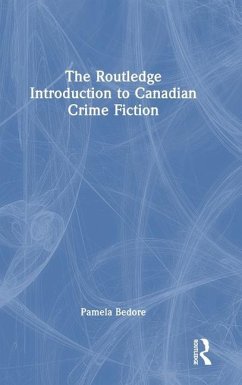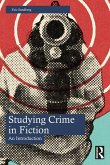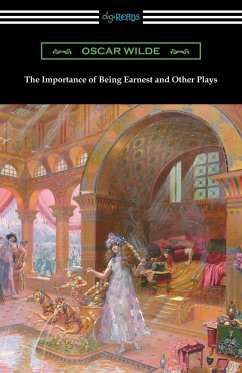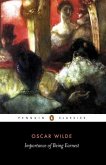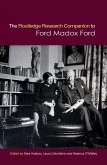Pamela Bedore
The Routledge Introduction to Canadian Crime Fiction
Pamela Bedore
The Routledge Introduction to Canadian Crime Fiction
- Gebundenes Buch
- Merkliste
- Auf die Merkliste
- Bewerten Bewerten
- Teilen
- Produkt teilen
- Produkterinnerung
- Produkterinnerung
The Routledge Introduction to Canadian Crime Fiction provides a much-needed investigation into how crime and detection have been, are, and will be represented within Canada's national literature, with an attention to contemporary popular and literary texts.
Andere Kunden interessierten sich auch für
![Studying Crime in Fiction Studying Crime in Fiction]() Eric SandbergStudying Crime in Fiction197,99 €
Eric SandbergStudying Crime in Fiction197,99 €![The Importance of Being Earnest and Other Plays The Importance of Being Earnest and Other Plays]() Oscar WildeThe Importance of Being Earnest and Other Plays15,99 €
Oscar WildeThe Importance of Being Earnest and Other Plays15,99 €![The Importance of Being Earnest and Other Plays The Importance of Being Earnest and Other Plays]() Oscar WildeThe Importance of Being Earnest and Other Plays9,49 €
Oscar WildeThe Importance of Being Earnest and Other Plays9,49 €![The History of Science Fiction The History of Science Fiction]() Adam RobertsThe History of Science Fiction64,99 €
Adam RobertsThe History of Science Fiction64,99 €![The History of Science Fiction The History of Science Fiction]() Adam RobertsThe History of Science Fiction90,99 €
Adam RobertsThe History of Science Fiction90,99 €![Other Animals in Twenty-First Century Fiction Other Animals in Twenty-First Century Fiction]() Catherine ParryOther Animals in Twenty-First Century Fiction67,99 €
Catherine ParryOther Animals in Twenty-First Century Fiction67,99 €![The Routledge Research Companion to Ford Madox Ford The Routledge Research Companion to Ford Madox Ford]() Sara HaslamThe Routledge Research Companion to Ford Madox Ford69,99 €
Sara HaslamThe Routledge Research Companion to Ford Madox Ford69,99 €-
-
-
The Routledge Introduction to Canadian Crime Fiction provides a much-needed investigation into how crime and detection have been, are, and will be represented within Canada's national literature, with an attention to contemporary popular and literary texts.
Hinweis: Dieser Artikel kann nur an eine deutsche Lieferadresse ausgeliefert werden.
Hinweis: Dieser Artikel kann nur an eine deutsche Lieferadresse ausgeliefert werden.
Produktdetails
- Produktdetails
- Verlag: Routledge
- Seitenzahl: 290
- Erscheinungstermin: 27. Februar 2024
- Englisch
- Abmessung: 235mm x 157mm x 20mm
- Gewicht: 574g
- ISBN-13: 9780367645731
- ISBN-10: 0367645734
- Artikelnr.: 69431696
- Herstellerkennzeichnung
- Libri GmbH
- Europaallee 1
- 36244 Bad Hersfeld
- gpsr@libri.de
- Verlag: Routledge
- Seitenzahl: 290
- Erscheinungstermin: 27. Februar 2024
- Englisch
- Abmessung: 235mm x 157mm x 20mm
- Gewicht: 574g
- ISBN-13: 9780367645731
- ISBN-10: 0367645734
- Artikelnr.: 69431696
- Herstellerkennzeichnung
- Libri GmbH
- Europaallee 1
- 36244 Bad Hersfeld
- gpsr@libri.de
Pamela Bedore is Associate Professor of English at the University of Connecticut, where she teaches courses in American Literature and Popular Culture. She holds BA and BEd degrees from Queen's University, an MA in English from Simon Fraser University, and a PhD in American Literature from the University of Rochester. She has published widely on detective fiction and speculative fiction, including the monograph Dime Novels and the Roots of American Detective Fiction (2013) and the lecture series Great Utopian and Dystopian Works of Literature (The Great Courses, 2017). Pam was the book review editor for Clues: A Journal of Detection for ten years and was recently a visiting scholar at an NEH Summer Institute on Climate Futurism.
Chapter 1. Negotiations of National Identity in Canadian Crime Fiction
Part 1: Historical Confrontations
Chapter 2. John McFetridge and the Legacy of French/English Tensions
Chapter 3. Giles Blunt and the Canadian North
Chapter 4. Thomas King and the Liminal Indigenous Detective
Chapter 5. Ausma Zehanat Khan and Multiculturalism in Canada
Chapter 6: Linwood Barclay and the American Dream
Part 2: Canadian Genre Play
Chapter 7. The Police Procedural: Registering Change with Peter Robinson's
DCI Banks
Chapter 8. The Amateur Detective: Gail Bowen's Joanne Kilbourn as Canadian
Revisionist
Chapter 9. The Gay Private Eye: Anthony Bidulka's Russell Quant
Chapter 10. The Legal Thriller: Trauma and Resilience in Pamela Callow's
Kate Lange
Chapter 11. The Postmodern Detective: Literary Detection in Timothy Findley
and Carol Shields
Part 3: Futuristic Explorations
Chapter 12. Louise Penny's Cozy Exploration of Trauma and Temporality in
the Anthropocene
Chapter 13. Storytelling, Guilt, and Games in Margaret Atwood's
Postapocalyptic Crime Fiction
Chapter 14. Interpretive Mysteries and Impossible Crimes in Emily St. John
Mandel's Speculative Fiction
Part 1: Historical Confrontations
Chapter 2. John McFetridge and the Legacy of French/English Tensions
Chapter 3. Giles Blunt and the Canadian North
Chapter 4. Thomas King and the Liminal Indigenous Detective
Chapter 5. Ausma Zehanat Khan and Multiculturalism in Canada
Chapter 6: Linwood Barclay and the American Dream
Part 2: Canadian Genre Play
Chapter 7. The Police Procedural: Registering Change with Peter Robinson's
DCI Banks
Chapter 8. The Amateur Detective: Gail Bowen's Joanne Kilbourn as Canadian
Revisionist
Chapter 9. The Gay Private Eye: Anthony Bidulka's Russell Quant
Chapter 10. The Legal Thriller: Trauma and Resilience in Pamela Callow's
Kate Lange
Chapter 11. The Postmodern Detective: Literary Detection in Timothy Findley
and Carol Shields
Part 3: Futuristic Explorations
Chapter 12. Louise Penny's Cozy Exploration of Trauma and Temporality in
the Anthropocene
Chapter 13. Storytelling, Guilt, and Games in Margaret Atwood's
Postapocalyptic Crime Fiction
Chapter 14. Interpretive Mysteries and Impossible Crimes in Emily St. John
Mandel's Speculative Fiction
Chapter 1. Negotiations of National Identity in Canadian Crime Fiction
Part 1: Historical Confrontations
Chapter 2. John McFetridge and the Legacy of French/English Tensions
Chapter 3. Giles Blunt and the Canadian North
Chapter 4. Thomas King and the Liminal Indigenous Detective
Chapter 5. Ausma Zehanat Khan and Multiculturalism in Canada
Chapter 6: Linwood Barclay and the American Dream
Part 2: Canadian Genre Play
Chapter 7. The Police Procedural: Registering Change with Peter Robinson's DCI Banks
Chapter 8. The Amateur Detective: Gail Bowen's Joanne Kilbourn as Canadian Revisionist
Chapter 9. The Gay Private Eye: Anthony Bidulka's Russell Quant
Chapter 10. The Legal Thriller: Trauma and Resilience in Pamela Callow's Kate Lange
Chapter 11. The Postmodern Detective: Literary Detection in Timothy Findley and Carol Shields
Part 3: Futuristic Explorations
Chapter 12. Louise Penny's Cozy Exploration of Trauma and Temporality in the Anthropocene
Chapter 13. Storytelling, Guilt, and Games in Margaret Atwood's Postapocalyptic Crime Fiction
Chapter 14. Interpretive Mysteries and Impossible Crimes in Emily St. John Mandel's Speculative Fiction
Part 1: Historical Confrontations
Chapter 2. John McFetridge and the Legacy of French/English Tensions
Chapter 3. Giles Blunt and the Canadian North
Chapter 4. Thomas King and the Liminal Indigenous Detective
Chapter 5. Ausma Zehanat Khan and Multiculturalism in Canada
Chapter 6: Linwood Barclay and the American Dream
Part 2: Canadian Genre Play
Chapter 7. The Police Procedural: Registering Change with Peter Robinson's DCI Banks
Chapter 8. The Amateur Detective: Gail Bowen's Joanne Kilbourn as Canadian Revisionist
Chapter 9. The Gay Private Eye: Anthony Bidulka's Russell Quant
Chapter 10. The Legal Thriller: Trauma and Resilience in Pamela Callow's Kate Lange
Chapter 11. The Postmodern Detective: Literary Detection in Timothy Findley and Carol Shields
Part 3: Futuristic Explorations
Chapter 12. Louise Penny's Cozy Exploration of Trauma and Temporality in the Anthropocene
Chapter 13. Storytelling, Guilt, and Games in Margaret Atwood's Postapocalyptic Crime Fiction
Chapter 14. Interpretive Mysteries and Impossible Crimes in Emily St. John Mandel's Speculative Fiction
Chapter 1. Negotiations of National Identity in Canadian Crime Fiction
Part 1: Historical Confrontations
Chapter 2. John McFetridge and the Legacy of French/English Tensions
Chapter 3. Giles Blunt and the Canadian North
Chapter 4. Thomas King and the Liminal Indigenous Detective
Chapter 5. Ausma Zehanat Khan and Multiculturalism in Canada
Chapter 6: Linwood Barclay and the American Dream
Part 2: Canadian Genre Play
Chapter 7. The Police Procedural: Registering Change with Peter Robinson's
DCI Banks
Chapter 8. The Amateur Detective: Gail Bowen's Joanne Kilbourn as Canadian
Revisionist
Chapter 9. The Gay Private Eye: Anthony Bidulka's Russell Quant
Chapter 10. The Legal Thriller: Trauma and Resilience in Pamela Callow's
Kate Lange
Chapter 11. The Postmodern Detective: Literary Detection in Timothy Findley
and Carol Shields
Part 3: Futuristic Explorations
Chapter 12. Louise Penny's Cozy Exploration of Trauma and Temporality in
the Anthropocene
Chapter 13. Storytelling, Guilt, and Games in Margaret Atwood's
Postapocalyptic Crime Fiction
Chapter 14. Interpretive Mysteries and Impossible Crimes in Emily St. John
Mandel's Speculative Fiction
Part 1: Historical Confrontations
Chapter 2. John McFetridge and the Legacy of French/English Tensions
Chapter 3. Giles Blunt and the Canadian North
Chapter 4. Thomas King and the Liminal Indigenous Detective
Chapter 5. Ausma Zehanat Khan and Multiculturalism in Canada
Chapter 6: Linwood Barclay and the American Dream
Part 2: Canadian Genre Play
Chapter 7. The Police Procedural: Registering Change with Peter Robinson's
DCI Banks
Chapter 8. The Amateur Detective: Gail Bowen's Joanne Kilbourn as Canadian
Revisionist
Chapter 9. The Gay Private Eye: Anthony Bidulka's Russell Quant
Chapter 10. The Legal Thriller: Trauma and Resilience in Pamela Callow's
Kate Lange
Chapter 11. The Postmodern Detective: Literary Detection in Timothy Findley
and Carol Shields
Part 3: Futuristic Explorations
Chapter 12. Louise Penny's Cozy Exploration of Trauma and Temporality in
the Anthropocene
Chapter 13. Storytelling, Guilt, and Games in Margaret Atwood's
Postapocalyptic Crime Fiction
Chapter 14. Interpretive Mysteries and Impossible Crimes in Emily St. John
Mandel's Speculative Fiction
Chapter 1. Negotiations of National Identity in Canadian Crime Fiction
Part 1: Historical Confrontations
Chapter 2. John McFetridge and the Legacy of French/English Tensions
Chapter 3. Giles Blunt and the Canadian North
Chapter 4. Thomas King and the Liminal Indigenous Detective
Chapter 5. Ausma Zehanat Khan and Multiculturalism in Canada
Chapter 6: Linwood Barclay and the American Dream
Part 2: Canadian Genre Play
Chapter 7. The Police Procedural: Registering Change with Peter Robinson's DCI Banks
Chapter 8. The Amateur Detective: Gail Bowen's Joanne Kilbourn as Canadian Revisionist
Chapter 9. The Gay Private Eye: Anthony Bidulka's Russell Quant
Chapter 10. The Legal Thriller: Trauma and Resilience in Pamela Callow's Kate Lange
Chapter 11. The Postmodern Detective: Literary Detection in Timothy Findley and Carol Shields
Part 3: Futuristic Explorations
Chapter 12. Louise Penny's Cozy Exploration of Trauma and Temporality in the Anthropocene
Chapter 13. Storytelling, Guilt, and Games in Margaret Atwood's Postapocalyptic Crime Fiction
Chapter 14. Interpretive Mysteries and Impossible Crimes in Emily St. John Mandel's Speculative Fiction
Part 1: Historical Confrontations
Chapter 2. John McFetridge and the Legacy of French/English Tensions
Chapter 3. Giles Blunt and the Canadian North
Chapter 4. Thomas King and the Liminal Indigenous Detective
Chapter 5. Ausma Zehanat Khan and Multiculturalism in Canada
Chapter 6: Linwood Barclay and the American Dream
Part 2: Canadian Genre Play
Chapter 7. The Police Procedural: Registering Change with Peter Robinson's DCI Banks
Chapter 8. The Amateur Detective: Gail Bowen's Joanne Kilbourn as Canadian Revisionist
Chapter 9. The Gay Private Eye: Anthony Bidulka's Russell Quant
Chapter 10. The Legal Thriller: Trauma and Resilience in Pamela Callow's Kate Lange
Chapter 11. The Postmodern Detective: Literary Detection in Timothy Findley and Carol Shields
Part 3: Futuristic Explorations
Chapter 12. Louise Penny's Cozy Exploration of Trauma and Temporality in the Anthropocene
Chapter 13. Storytelling, Guilt, and Games in Margaret Atwood's Postapocalyptic Crime Fiction
Chapter 14. Interpretive Mysteries and Impossible Crimes in Emily St. John Mandel's Speculative Fiction

